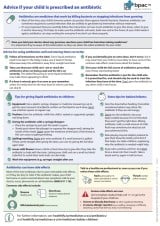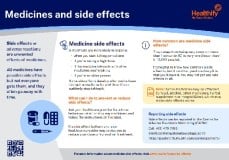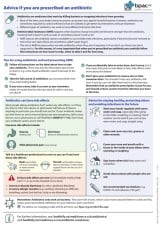You can now add Healthify as a preferred source on Google. Click here to see us when you search Google.
Erythromycin
Sounds like 'er-ith-roh-my-sin'
Key points about erythromycin
- Erythromycin is an antibiotic used to treat infections caused by bacteria.
- Erythromycin is also called E-Mycin®.
- Find out how to take it safely and possible side effects.

Erythromycin is an antibiotic that is used to treat infections caused by bacteria, such as whooping cough, pneumonia, strep throat, middle ear infections, cellulitis, campylobacter and syphilis. It's sometimes used to prevent infection.
It works by killing or stopping the growth of bacteria (bugs). It's often used for people who are allergic to penicillin. Like all antibiotics, erythromycin isn't effective against infections caused by viruses.
In Aotearoa New Zealand, erythromycin is available as tablets (400 mg) and liquid (200 mg in 5 mL or 400 mg in 5 mL) and can be given as an injection in the hospital.
- Always take your erythromycin exactly as your healthcare provider has told you. The pharmacy label on your medicine will tell you how much to take, how often to take it, and any special instructions.
- The dose of erythromycin will be different for different people depending on the type of infection and your age.
- Adults: the usual dose is 1 or 2 tablets taken 2 to 4 times a day.
- Children: the dose for children will depend on their body weight. It's usually given 2 to 4 times a day.
- Your healthcare provider will advise you on how long to take erythromycin for (usually 5 to 14 days, but depending on the infection, it could be longer).
- Food: You can take erythromycin with or without food. If you get a sore stomach try taking it with food.
- Tablets: Swallow the tablet with a glass of water. Don't chew them.
- Liquid: Shake the medicine well. Measure the right amount using an oral syringe or medicine spoon. You can buy these from your pharmacy. Don't use a kitchen spoon as it won't give you the right amount. Read more tips on how to give medicines to babies and children.
- Timing: Try to space your doses evenly throughout the day.
- Twice a day: this should be in the morning and in the evening.
- Three times each day: this should be in the morning, early afternoon and at bedtime.
- Four times each day: this should be about 6 hours apart, for example 7am, midday, 5pm and 11pm.
- Missed dose: If you forget to take your dose at the correct time, take one as soon as you remember. Try to take the correct number of doses each day. Don't take two doses at the same time to make up for a forgotten dose.
- If you vomit: If you’re sick (vomit) less than 30 minutes after having a dose of erythromycin, take the same dose again. But, if you’re sick more than 30 minutes after having a dose of erythromycin, you don’t need to take another dose. Wait until the next dose. If you’re vomiting and are worried, contact your healthcare provider or Healthline (0800 611 116) for advice.
Here are some things to know when you're taking erythromycin. Other things may be important as well, so ask your healthcare provider what you should know about.
- Storage: Store your tablets in a cool, dry place, away from direct heat and light. Keep liquid erythromycin in the fridge.
- Keep taking erythromycin until the course is finished: It’s best to take the whole course of antibiotics for the number of days your healthcare provider has told you to. Don’t stop taking it, even if you feel your infection has cleared up.
- Alcohol: Erythromycin doesn't directly interact with alcohol. This means that most people could have the occasional drink while taking it without any serious problems. However, if erythromycin makes you feel sick (nausea), don't drink alcohol as it can make this worse.
- Other medicines: Erythromycin interacts with some medicines, herbal supplements and rongoā Māori, so check with your healthcare provider before starting erythromycin and before starting any new products.
- If you’re sick: If you’re sick (vomit) less than 30 minutes after having a dose of erythromycin, take the same dose again. But, if you’re sick (vomit) and it’s more than 30 minutes after having a dose of erythromycin, you don’t need to take another dose. Wait until the next dose. If you’re vomiting and are worried, contact your healthcare provider or Healthline (0800 611 116) for advice.
- If you're taking the contraceptive pill: You don't usually need to use additional contraception if you're taking erythromycin. But if you have diarrhoea (runny poo/hamuti) or vomiting (being sick), lasting more than 24 hours, absorption of the contraceptive pill may be affected. If this happens, ask your healthcare provider or pharmacist for advice about contraception over the following few days.
- Grapefruit, grapefruit juice or sour/Seville oranges: Avoid grapefruit, grapefruit juice or foods containing grapefruit while taking erythromycin. It can increase your chance of side effects. Read more about grapefruit and medicines.
- Pregnancy or breastfeeding: Talk to your healthcare provider if you're pregnant, planning a pregnancy or want to breastfeed.
Like all medicines, erythromycin can cause side effects, although not everyone gets them. If you're concerned about any symptoms you think might be related to your medicine, talk to your healthcare provider. The following information offers some guidance but doesn't include all possible side effects.
Common side effects
Tell your healthcare provider if these side effects bother you.
- Sore tummy, feeling bloated, gas in the tummy: Try taking your erythromycin with food.
- Nausea (feeling sick), vomiting (being sick) or diarrhoea (runny poo): Tell your healthcare provider if your diarrhoea is severe, contains blood or lasts more than a few days. If you have a lot of diarrhoea or have been vomiting and you're taking the oral contraceptive pill, let your healthcare provider know.
- Not feeling hungry.
- Small white patches in your mouth or a white furry tongue (oral thrush): Ask your healthcare provider for advice.
- Vaginal itching, soreness or discharge (vaginal thrush): Ask your healthcare provider for advice.
Tell your healthcare provider immediately or phone Healthline free on 0800 611 116 if these occur
- Changes in your heartbeat (feeling like your heart is beating too fast or irregular).
- Signs of problems with your liver such as yellowing of the skin or eyes, dark urine, pain in the tummy.
Phone 111 for an ambulance or go to your nearest accident and emergency (A&E) clinic if these occur
- Signs of an allergic reaction such as itchy skin, and rash, swollen lips or tongue, problems breathing, like a tight chest or shortness of breath.
Read more about medicines and side effects and reporting a reaction you think might be a side effect.
The following links provide further information on erythromycin:
E-Mycin(external link) Medsafe Consumer Information Sheet, NZ
Erythromycin(external link) New Zealand Formulary Patient Information te reo Māori(external link)
Apps/tools
Erythromycin paediatric dose calculator
Brochures
Advice if you are prescribed an antibiotic(external link) BPAC, NZ, 2024
Advice if your child is prescribed an antibiotic(external link) BPAC, NZ, 2024
Medicines and side effects(external link) Healthify He Puna Waiora, NZ, 2024
References
- Erythromycin(external link) New Zealand Formulary
- Macrolides(external link) New Zealand Formulary
- Erythromycin(external link) New Zealand Formulary for Children
- Antibiotic guide – choices for common infections(external link) BPAC, NZ, 2023
- E-Mycin(external link) Medsafe datasheet, NZ
Brochures

Advice if your child is prescribed an antibiotic
BPAC, NZ, 2024

Medicines and side effects
Healthify He Puna Waiora, NZ, 2024
Credits: Healthify editorial team. Healthify is brought to you by Health Navigator Charitable Trust.
Reviewed by: Stephanie Yee, Pharmacist, Auckland.
Last reviewed:






